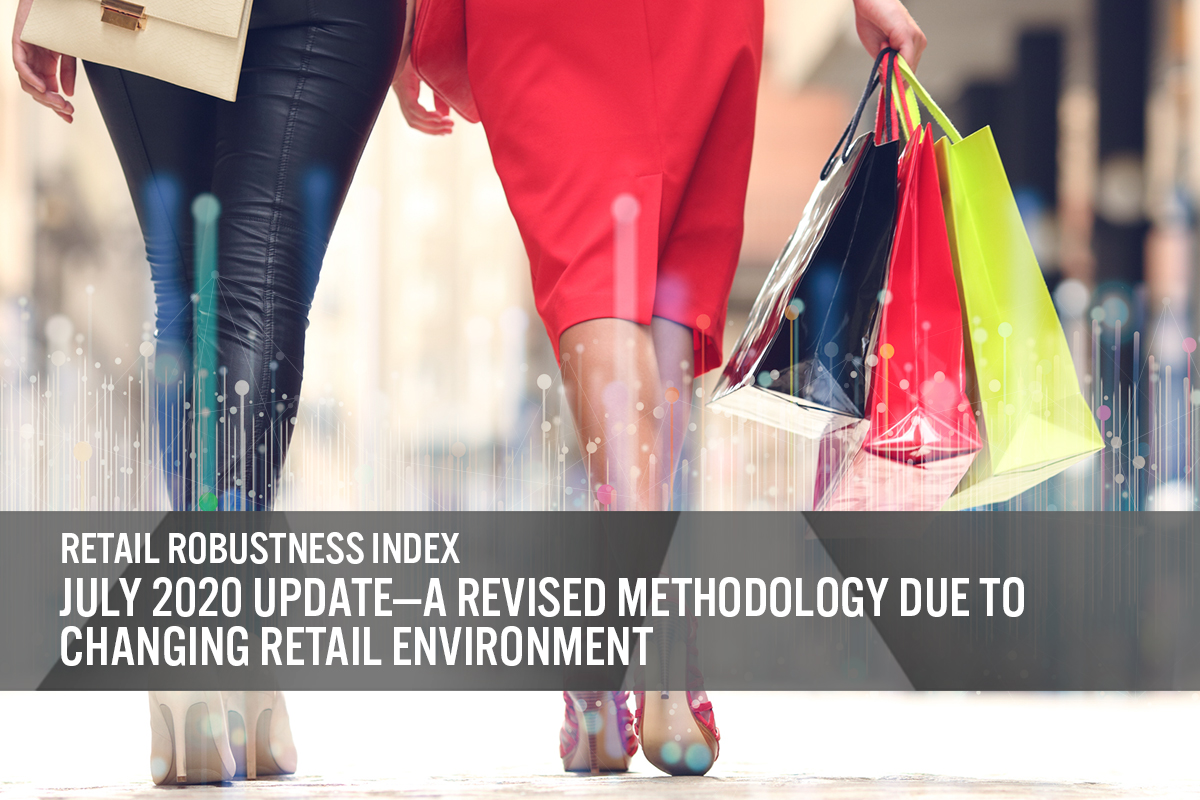
DIpil Das
This report presents Coresight Research’s updated Retail Robustness Index, which evaluates the 100 largest US retailers (by revenue) on their ability to weather the dramatic demand shifts due to the coronavirus crisis in the US.
We evaluate retailers based on financial health, sales capacity, product mix and management tenure.
Figure 1 presents the 10 retailers that rank highest in our index as of the start of July 2020.
Figure 1. Changes in Retail Robustness Index: Top 10 Retailers
[wpdatatable id=300 table_view=regular]
*Scores affected by change in methodology Source: Coresight Research Commentary on Score Changes
Source: Coresight Research For the Product Mix metric, beginning with this index, we are leveraging Coresight Research’s US consumer surveys, which collect consumer preferences on a weekly basis. Our new scores are based on a weighted average of product mix according to the most recent data in the categories below. Figure 3. All Respondents: Buying More/Less of Selected Categories (% of Respondents) [wpdatatable id=302 table_view=regular]
Base: US Internet users aged 18+ Source: Coresight Research The Retail Robustness Index runs from 0 to 100, with scores calculated for each company according to the following metrics (with the % weighting in parentheses):
Source: Coresight Research Notes on the Coresight Research Coronavirus Retail Robustness Index:
Source: Company reports/S&P Capital IQ/Coresight Research
*Scores affected by change in methodology Source: Coresight Research Commentary on Score Changes
- The average score across the full index increased to 45.8 from 45.4 in June, owing to average increases in all categories.
- Some retailers saw more pronounced score changes, which we outline below.
- Macy’s (increase of 26 points): Higher scores for financial health, sales capacity and product mix.
- Lululemon (increase of 21 points): Higher scores for financial health, sales capacity and product mix.
- Five Below (increase of 20 points): Higher scores for sales capacity and more-favorable product mix more than offsetting a decrease in financial health.
- Ross Stores (increase of 18 points): Higher scores for sales capacity and more-favorable product mix more than offsetting a decrease in financial health.
- Dillard’s (increase of 18 points): Higher scores for financial health, sales capacity and product mix.
Source: Coresight Research For the Product Mix metric, beginning with this index, we are leveraging Coresight Research’s US consumer surveys, which collect consumer preferences on a weekly basis. Our new scores are based on a weighted average of product mix according to the most recent data in the categories below. Figure 3. All Respondents: Buying More/Less of Selected Categories (% of Respondents) [wpdatatable id=302 table_view=regular]
Base: US Internet users aged 18+ Source: Coresight Research The Retail Robustness Index runs from 0 to 100, with scores calculated for each company according to the following metrics (with the % weighting in parentheses):
- Retailer financial health (40%): Represents a retailer’s financial state and ability to handle financial challenges. Commentary: Many retailers have subsequently drawn on their credit lines and/or issued debt offerings and reduced expenditures, which bolsters their financial position. One component of this score is the market value of a company’s stock, which affects its ability to raise additional capital.
- Sales capacity (20%): Represents a retailer’s ability to sell products. Commentary: This score is based on the percentage of a retailer’s stores that are currently open.
- Product mix (20%): Determines the relative benefit of a retailer’s product categories. Commentary: The score is now calculated from a weighted average based on Coresight Research weekly consumer surveys.
- Management tenure (20%): Reflects the number of years that the CEO has served in the position. Commentary: CEOs who have occupied their positions for longer should be better acquainted with the company and better equipped to navigate the current environment.
Source: Coresight Research Notes on the Coresight Research Coronavirus Retail Robustness Index:
- The index is a model for retailer robustness and as such relies on certain assumptions and estimates.
- The environment is evolving dramatically at a fast pace: Figures are thought to be accurate as of writing but may change as companies continue to report quarterly earnings.
- The index is not a predictor of retailer future financial health.
Source: Company reports/S&P Capital IQ/Coresight Research